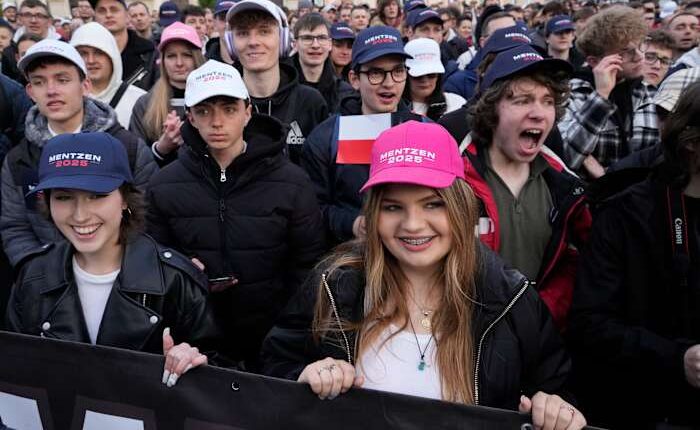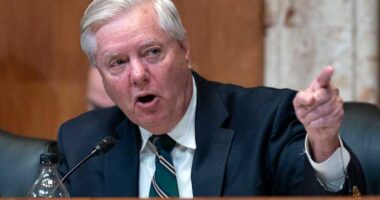
WARSAW – In Poland, the upcoming presidential election offers a clear choice between two candidates: a liberal pro-European mayor and a nationalist conservative. With both candidates neck and neck in the polls, the outcome of the run-off round on Sunday remains uncertain.
The election has caught international attention as President Donald Trump has voiced support for the nationalist candidate, Karol Nawrocki, emphasizing the potential for closer military cooperation if Nawrocki wins over the liberal Warsaw Mayor Rafał Trzaskowski.
A contest with global implications
Recently, Trump met with Nawrocki at the White House and had his Homeland Security Secretary Kristi Noem endorse Nawrocki at a gathering of the conservative group CPAC in Poland.
Noem even dangled the prospect of closer U.S.-Polish military ties in the event of a Nawrocki win — with the implied warning that a Trzaskowski victory could jeopardize Poland’s security.
At stake is not only Poland’s domestic course but also the international standing of a key European Union and NATO member on the alliance’s eastern flank, in a region gripped by anxiety over Russia’s war in Ukraine.
Sunday’s vote will either empower Prime Minister Donald Tusk, a pro-EU reformer, with a presidential ally who can advance his rule-of-law agenda — or saddle him with a rival who could veto legislation and block government initiatives.
Trzaskowski’s supporters argue that a pro-European leader would enhance Poland’s global standing during a time of war in Europe. Nawrocki’s backers believe only conservative rule can safeguard national sovereignty and traditional Christian values, and they say Trump’s support would greatly enhance Poland’s security.
Growing support for the populist right
But the candidate who may ultimately decide the outcome is one who won’t appear on the runoff ballot.
Sławomir Mentzen, a 38-year-old far-right politician and beer producer from the central city of Torun, finished third in the first round of voting on May 18, with nearly 15% of the vote. Though eliminated, his supporters — often young, anti-establishment, and deeply skeptical of both Brussels and Poland’s political establishment — have become the most sought-after constituency in the country.
Both remaining candidates have gone out of their way to court Mentzen and his base. In recent days, each man traveled to the north-central Polish town of Torun, famous for being the birthplace of astronomer Nicolaus Copernicus, to appear on Mentzen’s YouTube channel, where he has built a following with a mix of libertarian economics, nationalist rhetoric, and anti-EU invective.
His influence highlights a broader shift in Polish politics, where the far right — once considered a fringe force — is increasingly shaping the national agenda. It’s also part of a larger trend of hard-right parties gaining traction across Europe.
The appeal of right-wing forces in changing times
Piotr Buras, head of the European Council on Foreign Relations’ Warsaw office, says Poland is part of a larger pattern in which voters turn to populist forces amid rapid social change. But he also cites local factors, such as disillusionment with Tusk’s coalition.
That coalition, which spans the ideological spectrum, has struggled to agree on key issues, including liberalizing the abortion law — a campaign promise. Meanwhile, outgoing conservative President Andrzej Duda has blocked parts of Tusk’s agenda. Observers say the coalition’s voters must be highly mobilized on Sunday to defeat Nawrocki.
Many votes in the first round went to protest candidates. Among voters aged 18–29, over 35% backed Mentzen, and nearly 20% supported a far-left candidate, Adrian Zandberg, according to exit polls.
In addition, an extreme right-wing antisemite, Grzegorz Braun, won more than 6% of the votes overall.
Buras believes right-wing protest candidates are more appealing today than those on the left because they promise to restore a lost past, while the left promises a better future that many see as unattainable.
“The world is changing, society is changing very fast, much faster than anytime in the past,” Buras said. “People are worried and they vote for those who say we can go back to the glorious past.”
Campaigning on a YouTube stage
Since the first round, Mentzen — co-leader of the Confederation party — has presented both candidates with an eight-point list of demands: no new taxes; defense of cash payments; expanded gun rights; and opposition to NATO membership for Ukraine, among others.
Nawrocki, who appeared on Mentzen’s show on June 22, signed on to all eight points — including the controversial Ukraine stance — breaking with his Law and Justice party’s longstanding support for Kyiv’s integration with the West.
Trzaskowski appeared two days later. He said he could agree with some points, like fiscal restraint, but rejected others. He strongly defended LGBTQ+ rights and reaffirmed that Ukraine should eventually join NATO, once the war ends, calling it key to Poland’s own security.
The YouTube interviews have dominated the political conversation, underscoring how Mentzen, a TikTok-savvy outsider, has upended traditional campaigning.
The exchange between Trzaskowski and Mentzen on Saturday was occasionally tense, especially over LGBTQ+ rights, but remained civil and substantive.
In many ways it overshadowed a traditional televised debate the day before. The substance of that debate did not seem to change the trajectory of the campaign. The thing Poles discussed most was a brief moment when Nawrocki inserted something into his mouth which he later said was a tobacco pouch. Some have questioned if he is fit to be president if he couldn’t get through a two-hour debate without taking a hit of tobacco.
A post-debate meeting over beer
After the sometimes sharp exchanges, Mentzen sat down for a beer with Trzaskowski and others in the pub he owns.
The informal gathering was documented by Foreign Minister Radek Sikorski, who was there as well. He posted a video on social media Saturday evening showing the group with the words: “For a Poland that unites, not divides.”
The video quickly went viral, with commentators speculating about whether it was a spontaneous gesture or a calculated political move.
It was also one more example, if more were needed, of how far-right forces in Europe are slowly becoming accepted.
For Mentzen, the moment was also awkward. The man who made his name skewering the political elite appeared cozy with establishment figures. Critics on the hard right lashed out, revealing fractures in the movement he helped popularize.
After dangling the promises of an endorsement for days, Mentzen on Wednesday afternoon said he wouldn’t offer one to either candidate. “Vote as your conscience tells you,” he told his supporters.
Copyright 2025 The Associated Press. All rights reserved. This material may not be published, broadcast, rewritten or redistributed without permission.















